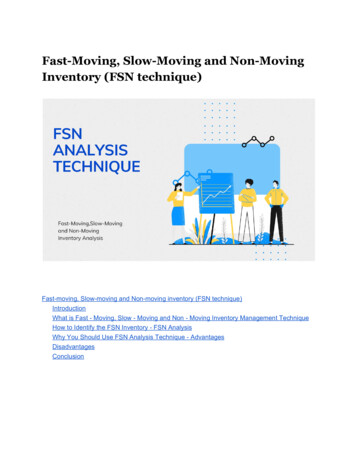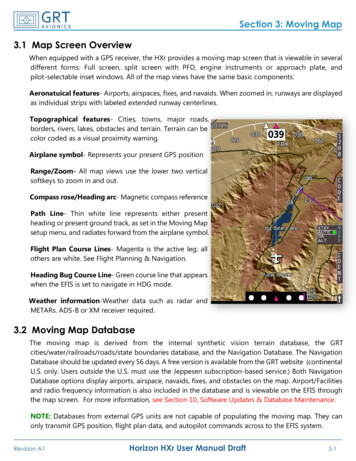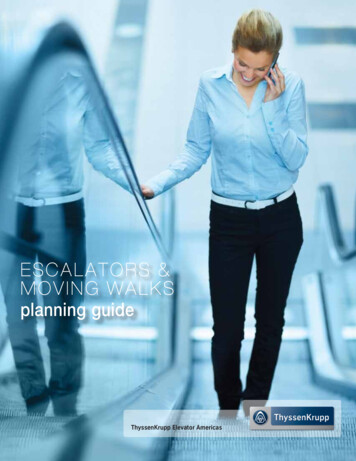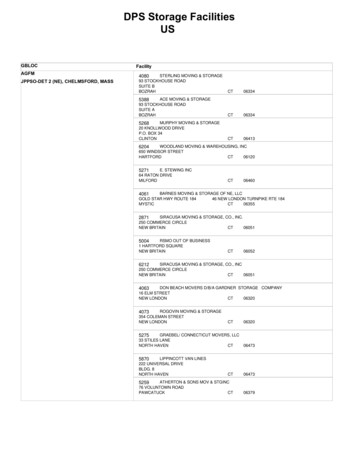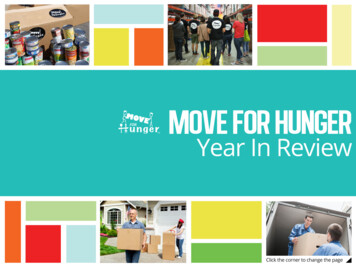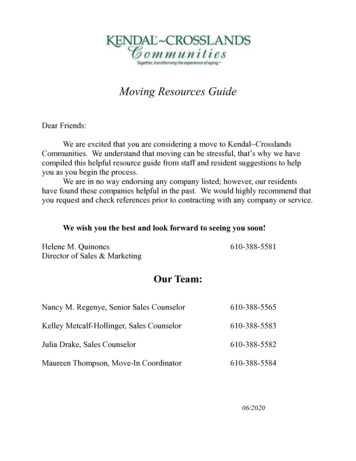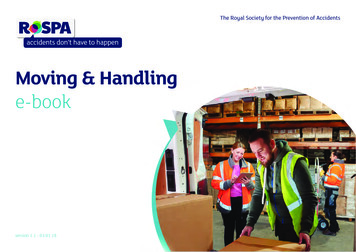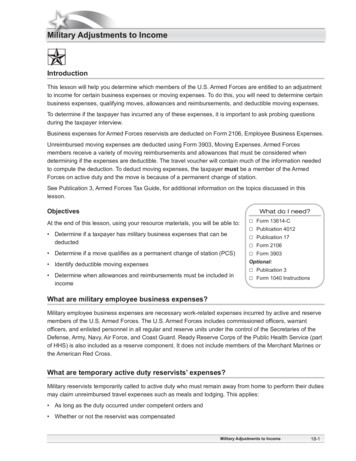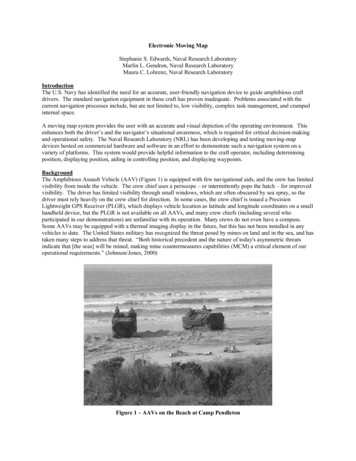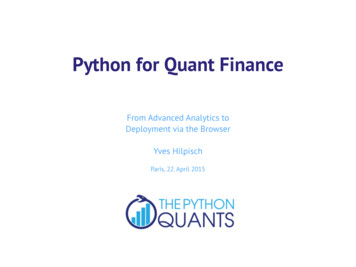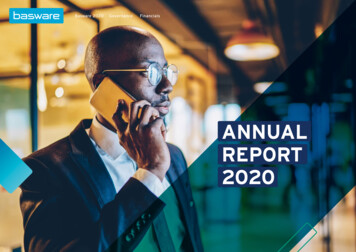
Transcription
2020Annual ReportMoving Forward in the Face of COVID-19NACCHO Annual Report 2020 1
Executive LetterThe Moments We Were Made for in 20202020 was unlike any year our field has endured since 1918–19, the year of the flu pandemic. First identified in theUnited States in military personnel, its sweep infected one-third of the world’s population, or around 500 millionpeople. The number of deaths was estimated to be at least 50 million worldwide, with about 675,000 occurring inthe U.S. No less fearsome, the COVID-19 pandemic continues to rage throughout the world; at the start of 2021, itis estimated that over 400,000 Americans have lost their lives. Although vaccines have been developed in recordtime, their distribution and administration has been inconsistent, and a new, highly infectious virus variant, B1.1.7.,is becoming dominant. Pandemics upend life as we know it, and COVID-19 has changed the way we work and live,perhaps forever.Throughout the response, local health departments (LHDs) found themselves hamstrung by inconsistent directivesand the lack of funding, which never matched the urgency of the pandemic’s global surge. Yet, against these odds,public health—all of you—showed up day after day, taking on pandemic work while responding to the daily needs ofyour communities. Even as the crisis of leadership unfolded, in which over 100 health officials and personnel left theirjobs under pressure, were fired, or retired, you continued to serve your communities.“As we do our work, we build trust in the power of public health. This is our work,and our legacy. Your resilience during this unceasing pandemic has been an inspiration.”From dedicated health directors leading the way to skilled disease intervention specialists to emergency personnel,public health’s response has been exceptional. While deep in our pandemic response, we didn’t forget about the coreof our work, which spans opioid response efforts, preparedness, HIV/STI, infectious disease, and immunizations.Ultimately, NACCHO’s charge is to be a forward-leaning association that listens to members, responds to their needs,supports their missions locally, and keeps them at the center of all that we do. We will amplify your work through ourstories and publications and our work with public health partners, and we will continue to magnify your reality, value,and relevance.NACCHO will continue to follow the science as it leads us towards evidence-based and promising practices to protectthe communities we serve every day. Our strategic priorities will guide our work and help us to lead and support ourmembers to advance population health. We want to thank you all for your expertise, your striving to do better thanyour best, your enthusiastic engagement, and the grace you bring to your work every day. We simply cannot do ourbest work without you.Lori Tremmel Freeman, MBAChief Executive OfficerNACCHOJennifer Kertanis, MPHNACCHO President andHealth Director forFarmington Valley HealthDistrict in Canton, CTNACCHO Annual Report 2020 2
Board of DirectorsOfficersPresidentJennifer C. Kertanis, MPHFarmington Valley HealthDistrict, CTPresident-ElectSandra Elizabeth Ford, MD, MBADekalb County HealthDepartment, GAVice PresidentLisa Macon Harrison, MPHGranville Vance Public Health, NCImmediate-Past PresidentGeorge T. Roberts, Jr., MHA, FACHENortheast Texas Public HealthDistrict, TXMembersDamon Chaplin, MBANew Bedford HealthDepartment, MAReggie Ivey, MHRTulsa City-County HealthDepartment, OKRenae Moch, MBA, FACMPEBismarck-Burleigh PublicHealth, NDPramod Dwivedi, MA, MSW, MS,DrPH(c)Linn County Public HealthDepartment, IAMargaret Jahn, MS, MPHFreehold Area HealthDepartment, NJGretchen Musicant, RN, MPHMinneapolis HealthDepartment, MNCameron Kaiser, MD, MPH, FAAFPRiverside County Department ofPublic Health, CAScott Sjoquist, MS, RSMohegan Tribal Health, CTKim Engel, MBAPanhandle Public HealthDistrict, NEAndre Fresco, MPAYakima Health District, WAPhilip Huang, MD, MPHDallas County Health and HumanServices, TXMichael Kilkenny, MD, MSCabell-Huntington HealthDepartment, WVJoey SmithMontgomery County HealthDepartment, TNPatrick G. McGough, DNP, MSHR,RN, CHAOklahoma City-County HealthDepartment, OKNACCHO Annual Report 2020 3
MembershipMembership QuickviewCelebrating the Nation’s Best Local Public Health PracticesNACCHO’s Model Practices Awards is an annual program thatrecognizes outstanding local public health practices and initiativesthat demonstrate exemplary and replicable outcomes in responseto an identified public health need. At the 2020 NACCHO 360Conference, 21 Model Practices and 36 Promising Practices wereawarded.NACCHO’s Model Practice Programprovides the opportunity to benationally recognized for new,innovative or best practices. ThroughNACCHO membership DOH-Browardhas been awarded 6 Model Practices,33 Promising Practices, and a largeHealth Department of the Year Award.We look forward to continuing ourpartnership with NACCHO.— Caroline Bartha, Director ofPerformance Excellence, FloridaDepartment of Health-Broward CountyOver 1,400Members97%Retention Rate328,000,000 people servedby our members25,000 local healthprofessionals and partnersNACCHO Annual Report 2020 4
NACCHO Response to COVID-19COVID-19 Data LabCOVID-19 Pandemic: Serving as aNational Voice and Resource forMembersBeginning in January, up to 50NACCHO staff have been involved inresponse to the COVID-19 pandemic,including standing up NACCHO’sIncident Command Structure andserving as liaison officers in theCenters for Disease Control andPrevention (CDC) and the Office of theAssistant Secretary for Preparednessand Response (ASPR) EmergencyOperation Centers. In this ongoingresponse, NACCHO supports andadvocates for members with federalpartners and provides memberswith timely and relevant informationthrough email, calls, bi-weeklywebinars, the Preparedness Brief blog,and the Virtual Communities platform.NACCHO works to ensure federalofficials integral to the response candirectly respond to issues facing localpublic health and encourages LHDs totalk about specific needs and issues.A Novel Non-profit andCommercial PartnershipZS Associates partnered withNACCHO’s ICS response and Researchand Evaluation teams to provide probono support to the organization’sCOVID response efforts. In thereporting year, ZS contributed over1,100 hours of staff time to effortsranging from technical support ofthe COVID-19 Data Lab, to the keyinformant interviews in support ofthe ICS Workforce Taskforce. Mostnotably, ICS provided wrap-aroundproject management and technicalcapacity for building a state-of-the-artdashboard for communicating dataand insights from NACCHO’s 2019Profile of Local Health Departmentssurvey.Contact Tracing Resources forCOVID-19 ResponseDrawing upon the ongoing workof contact tracers in the STI andHIV space, NACCHO’s HIV, STI, andViral Hepatitis team led NACCHO’sefforts to support LHDs in scalingup COVID-19 contact tracing byestablishing a resource page. Thishub highlights the most usefulresources from governmental publichealth, academia, think tanks, andnonprofits to support LHDs indesigning, establishing, scaling up,and strengthening contact tracingprograms.In response to the COVIDpandemic, NACCHO partneredwith Esri to provide timely,useful data for LHDs. First,NACCHO created a dashboardcalled COVID-19 Cases,Testing, and Deaths for LocalGovernments. Created in April2020, this dashboard has gonethrough several iterations asdata and needs evolved. Thesecond dashboard was theCommunity and COVID-19Dashboard, which formed asa response to the need forlocalized data related to reopening communities.These, as well as additional,externally developeddashboards reside onNACCHO’s COVID-19 Data Lab.The Data Lab had 15,159 pageviews in 2020, with 12,217unique visitors. NACCHO’sdashboards and data are alsopublicly available on Esri’splatform. According to Esri’sanalytics, the COVID-19 Cases,Testing, and Deaths dashboardhas a view count of 37,241and the Community andCOVID-19 Dashboard has aview count of 3,015 for 2020.NACCHO Annual Report 2020 5
Advocacy & Public AffairsMaking Your Voice Heard onCapitol HillEvery day, NACCHO spreads themessage about the lifesaving work ourmembers do. In February 2020, the NACCHO GovernmentAffairs team successfully executed our second annual “PublicHealth on the Hill Day,” a collaboration where NACCHO’sBoard, as well as leaders from the SACCHOs, Big Cities HealthCoalition, NALBOH, and ASTHO went to the Hill to advocateand educate Congress on the need for a strong COVID-19response. A few weeks later, NACCHO Government Affairsswiftly and seamlessly made the transition to a virtualadvocacy platform, connecting lawmakers and their staff withlocal health department leaders on the ground virtually todiscuss the many facets of the response, including fundingchallenges, testing capacity, and vaccine roll-out. Theseconversations were integral to informing the COVID-19 reliefpackages crafted by Congress.NACCHO’s efforts helped spur Congress to pass its firstCOVID-19 relief bill within a few weeks of the first cases inthe U.S. NACCHO has continued to be a key voice for publichealth in subsequent negotiations. To date, five emergencyfunding packages have been signed into law and wecontinue to advocate for the funding and policies neededto support the pandemic response. As of January 2021,Congress has appropriated nearly 35 billion in funding forthe governmental public health system to combat COVID-19.Additional advocacy with the administration has been criticalto ensure that the needs of local health are considered in theirpolicies and guidance documents.41 Letters to theAdministration11 Action Alerts toNACCHO’s CongressionalAction Network25 Podcasts on Policy,Advocacy, and Other Topics2 Advocacy Trainings1 Town Hall2 Hearing Speakers91 Letters toCongressNACCHO and ASTHO Hold Joint BriefingIn November 2019, NACCHO and the Association of State andTerritorial Health Officials (ASTHO) collaborated on a briefingfor congressional staff: “Vaping and Electronic NicotineDelivery Systems: A View from the Front Lines of Public Health.”The briefing featured Susan Palchick, PhD, MPH, Public HealthDirector, Hennepin County (MN) Public Health and the statehealth official from Massachusetts.200 Meetings withMembers of Congress andCongressional staff byNACCHO and members45 fromstatesNACCHO Annual Report 2020 6
Advocacy & Public AffairsGlobal-to-Local Public HealthInformation and InnovationsWith funding from the Robert WoodJohnson Foundation and using theinformation gleaned in year 1, NACCHO’sGlobal Health program team has pilotedan initiative to educate LHDs on WorldHealth Organization (WHO) strategies toaddress mental health and substance usedisorder in their communities, specificallythrough non-specialist providers ofcare, such as Medical Reserve Corps orcommunity health workers.In this program, three LHDs will beprovided with small grants to receivetraining and technical assistance fromDr. Shekhar Saxena, Professor of thePractice of Global Mental Health atHarvard University and former Directorof the Department of Mental Healthand Substance Abuse at the WHO, toimplement these strategies in theircommunities.NACCHO Leads Introduction of Public Health Workforce BillPublic health workforce is one of the top priorities on NACCHO’sLegislative and Policy Agenda. In 2020, NACCHO built a coalition ofmore than 100 public health, healthcare, and labor organizationsto support efforts to strengthen the governmental public healthworkforce. We also worked closely with Members of Congress toauthor and introduce legislation in the House and Senate to bolsterhealth department workforce recruitment and retention. The PublicHealth Workforce Loan Repayment Act (H.R. 6578, introduced byRepresentatives Jason Crow (D-CO) and Dr. Michael Burgess (RTX)) and the Strengthening the Public Health Workforce Act (S.3737,introduced by Senators Tina Smith (D-MN) and Cory Booker (DNJ)) would establish a loan repayment program for public healthprofessionals who agree to serve a designated time period in a local,state, or tribal health department.This provision was passed by the House of Representatives as partof the Heroes Act (H.R. 6800), but not included in the final law. Wewill continue to work to get the bill signed into law during the 117thCongress.Information on the benefits, challenges,and lessons learned from this processwill be gathered at the end of the grantperiod to add to developing guidanceon effective adoption and adaptation ofglobal health strategies for LHD use.NACCHO Annual Report 2020 7
Communications, Media, & Capacity Building14 Presentations atExternal 31Publications7 Peer-ReviewedJournalsEarning Media Coverage of Local Public Health Issues During theCovid-19 PandemicIn 2020, NACCHO continued to emerge as a leader in the public health news space,generating extensive print and broadcast news coverage for the organization andits members. The COVID-19 pandemic brought unprecedented media interestedin our members’ work. NACCHO received more than 500 interview requests in2020 from top-tier media outlets including The New York Times, The WashingtonPost, The Wall Street Journal, CNN, National Public Radio, TIME Magazine, and manyothers. Often many of the reporters requested referrals to NACCHO membersdoing the work on the ground protecting their communities from the deadlyvirus. NACCHO executives were interviewed for the national perspective bylocal television stations over Skype, and conducted radio interviews, as well ashundreds of print interviews. 2,781,801Subawards to LHDs6 WorkshopsIn March 2020, then NACCHO Board President George T. Roberts, Jr. was invited tothe National Press Club in Washington, DC to discuss the local health departmentresponse to COVID-19. His speech was broadcast live by C-SPAN.Many of the initial interview requests focused on LHD preparedness issues.NACCHO’s government affairs department contacted the press, stressing theurgent need for increased funding, the state of workforce shortages hindering theeffort, and the need for more contact tracers.200 HoursTechnical AssistanceAs the pandemic wore on, the CDC’s recommendation for use of masks becamea political issue. NACCHO’s Chief Executive Officer, Lori Tremmel Freeman,conducted many interviews and was asked about the numbers of LHD executivedirectors who were fired, quit, or retired—some of whom had crowds protestingat their residences. Many of those who left their positions were women.29 Webinars
Convening the Nation’sPublic Health PreparednessCommunityConferencesIn August, more than 1,300 attendeesparticipated in the first-ever virtualPreparedness Summit. Attendeesparticipated in more than 115 demos,workshops, and learning sessions, and heardfrom expert-led panels, providing them anopportunity to prepare for, respond to, andrecover from the waves of the COVID-19pandemic and the many other threats topublic health and health security.NACCHO 360: Raising the Reachof Public HealthOn July 7–9, 2020, approximately600 local public health professionalsparticipated in NACCHO’s first-evervirtual conference, NACCHO 360,a new spin on NACCHO’s annualconference. This two-prongedconvening featured the traditionalNACCHO Annual Conference andPHIITS: Public Health Informatics,Information Technology, andSurveillance, a reimagined PublicHealth Informatics (PHI) Conferencethat goes beyond informaticsto also explore local healthdepartment information technologyinfrastructure and public healthsurveillance, designed with the aimof empowering cross-pollination.The theme, “Raising the Reachof Public Health,” focusedspecifically on how local publichealth professionals can buildstrong, effective cross-disciplinarypartnerships. Each general sessionheld its own focus, however;all echoed the importance ofdeveloping effective partnerships,addressing the social determinantsof health, improving health equity,and telling compelling stories.Attendees participated in nearly100 sharing sessions, learned fromexpert-led panels, and discoveredsolutions to improve public health intheir communities.Conference participants attendedthe New Member and First Attendeeevent, focus groups, a forum forsmall LHDs, and a Model PracticesQuick Hits session that highlighted afew of the year’s winners.Attendees also participated inseveral interactive workshops thatcovered different public healthtopics, including climate change,immunization, health equity, ethics,and workforce development.The Summit’s theme, “Fixing Our Fault Lines:Addressing Systemic Vulnerabilities,” echoedthroughout the sessions as attendees andspeakers explored the many ways thepandemic is exposing and exacerbating thepre-existing cracks in our nation’s health andemergency preparedness infrastructures.Three plenary sessions explored perspectivesfrom the field, managing stress, andaddressing structural racism in the era ofCOVID-19. The Summit offered eight partnerand policy town halls on topics rangingfrom wildfire preparedness to COVID-19vaccine planning and implementation tocrisis standards of care, and more. Attendeesparticipated in a Meet & Greet, the ProjectPublic Health Ready Awards Ceremony andNetworking Reception, and the HeroesHappy Hour. They also took part in morethan a dozen live demos and workshopsfocused on a range of preparedness topics.The conference offered liveinteroperability demonstrations thatexplored COVID-related and otherscenarios and showed how seamlesshealth information exchangein public health can contributeto improve outcomes, engageconsumers, and support regulations.NACCHO Annual Report 2020 9
Community HealthStrengthening LHDCapacity in InfectionPrevention and ControlThe COVID-19 pandemic hasheightened public awareness ofthe importance of public healthin various healthcare settings,revealed critical opportunities toimprove infection prevention andcontrol (IPC), and illuminated theripple effects that gaps in IPC canhave in healthcare facilities andcommunities. To support LHD IPCefforts, NACCHO has awardedfunding to 25 LHDs through theBuilding Local Operational Capacityfor COVID-19 (BLOC COVID-19)demonstration site project. The goalof this project is to enhance localcapacity to prevent and respond toCOVID-19 by building LHD capacityin IPC, supporting identifiedhigh-risk facilities by conducting inperson or virtual IPC assessments,and expanding collaboration andcoordination between LHDs andcommunity infection preventionpartners.NACCHO is also a partner in CDC’sProject Firstline, a comprehensiveinfection control program designedto help prevent the spreadof infectious diseases in U.S.healthcare settings. NACCHO hasengaged with CDC and more thana dozen healthcare, public health,and academic partners, as wellas 64 state, territorial, and localhealth departments to supportdevelopment and disseminationof an innovative, interactive IPCcurriculum for healthcare and publichealth workforces across the UnitedStates.Strengthening LHD Capacity toIncrease Vaccine Confidence andImmunization CoverageNACCHO funded two LHDs toimplement projects combatting vaccinehesitancy and misinformation withinunvaccinated individuals and releaseda fact sheet detailing LHDs’ role inpromoting vaccine confidence withinlocal communities. To highlight thesignificance of vaccine-preventabledisease outbreaks occurring in 2019and 2020, NACCHO hosted webinarsfocusing on the mumps outbreaksin U.S. detention facilities, as well aslocal public health efforts to combatmeasles outbreaks. In response tothe emerging COVID-19 pandemic,NACCHO conducted an assessment toexamine the impact of COVID-19 on theLHD immunization program workforce,funding, coverage rates, outreachactivities, and innovative servicedelivery strategies. In preparation forthe historic COVID-19 vaccinationdistribution and administration,NACCHO began to hold webinars andshare resources, such as a FrequentlyAnswered Questions document relatedto large-scale vaccine distribution andresponse efforts to prepare for theallocation of COVID-19 vaccines.Continuing Education Credits MadeAvailable for Health and DisabilityTrainingSince 2017, NACCHO University hashosted an online training, Health andDisability 101: Training for HealthDepartment Employees. This trainingprovides foundational knowledgeabout people with disabilities, thehealth disparities that they experience,and how local health department staffcan include people with disabilitiesin their public health programs andservices. Through a CDC certificationprocess, this training now has freecontinuing education (CE) creditsavailable for nurses, certified publichealth professionals, and certifiedhealth education specialists.NACCHO Annual Report 2020 10
Community HealthMitigating HIV, STI, and ViralHepatitis in the U.S.Cardiovascular HealthCommunity of PracticeNACCHO provided technicalassistance to jurisdictions targetedunder the federal Ending the HIVEpidemic initiative and enteredinto a partnership with the CAEARCoalition to better support RyanWhite Part A jurisdictions in deliveryof care to people living with HIV. Asthe COVID-19 pandemic advanced,NACCHO was one of the first nationalorganizations to assess and highlightits impact on LHD HIV, STI, and viralhepatitis programs. Subsequently,NACCHO promoted HIV self-testingoptions and initiated a project toevaluate integration of STI selftesting into clinic protocols at pilotLHD sites. NACCHO surveyed LHDhepatitis programs to inform futuretechnical assistance response, andintroduced a program to strengthenmonitoring and evaluation capacityof LHD and community basedsyringe service programs.NACCHO’s Chronic Disease Teamcompiled a membership list of over100 representatives from nationalpartners and LHDs working oncommunity-level cardiovasculardisease prevention. In July theteam published an online toolkit tosupport LHDs’ policy and programefforts to improve cardiovascularhealth. The toolkit featuresguidelines and research; planningand program implementationresources; and success stories.Food Service Guidelines ActionInstituteNACCHO hosted the 2nd FoodService Guidelines (FSG) LocalAction Institute in Atlanta. Sixcommunities were competitivelyselected to participate in the FSGLocal Action Institute. The selectedcommunities demonstrated therequired team make-up, as well asthe ability to influence healthy foodprocurement practices and foodservice operations. Year 2 awardeesrepresent both CDC SPAN andREACH awardees.Tobacco-Use Prevention andControlNACCHO hosted a webinar alongNational Network of Public HealthInstitutes and University of SouthernMaine to discuss two recent ruraltobacco reports. This webinar hadover 600 registrants. NACCHO hasalso partnered with other CDCawardees, including Changelab andFrameworks Institute to publicizeand promote work focused ontobacco disparities messaging.Overdose Prevention andResponse Mentorship ProgramParticipants supported under thisCDC-funded program received peerto-peer assistance and intensivetechnical support from their mentorsand NACCHO. A total of 19 menteeswere paired with 10 mentors toimprove their capacity to respond tothe drug overdose epidemic in theircommunities.The Breastfeeding Projectin 2020Through 2020, as part of the ReducingBreastfeeding Disparities through Continuityof Care project, NACCHO’s Breastfeedingteam engaged over 100 breastfeedingcontent experts to collaborate and informthe content of a national blueprint oncontinuity of care in community lactationsupport. The team also delivered twonational webinars with a combined total ofover 750 live attendees. Also, NACCHO hasbeen the designated subject matter expertbreastfeeding technical assistance providerfor the CDC Racial and Ethnic Approachesto Community Health (REACH) programand has supported their 36 recipients.Finally, the team also published the BuildingBreastfeeding Support Models for CommunityHealth Centers report and used this guidancedocument to providing funding andtechnical assistance to three communitylevel grantees to implement breastfeedingcontinuity of care activities in partnershipwith a CDC REACH recipient.Whether the question is about the nationwideopioid epidemic or the ongoing COVID-19pandemic, NACCHO has been a very helpfulsource of practical information to guide ourwork and an important avenue for sharing ideaswhere we, as a local health department, haveplayed a leadership role such as establishing thePrescription Drug Monitoring Program (PDMP)at the local level. — Nhial Tutlam, PhD, ChronicDisease Epidemiology Manager, Saint LouisCounty Department of Public HealthNACCHO Annual Report 2020 11
Environmental HealthContinuing Local Momentumof Climate Change InitiativesAcross the CountryIn 2020, NACCHO funded two LHDsto supplement their ongoing climatechange and health adaptation initiatives.NACCHO also partnered with ecoAmericato create a guide for health departmentsto frame their work around climatechange when communicating with thepublic. Additionally, NACCHO partneredwith ecoAmerica to deliver a Climate forHealth Ambassadors training during the2020 NACCHO 360 conference, resultingin seven local health officials signing onto continue advocating for, and educatingon, climate solutions.adapt and fulfill their critical public healthfunction while still maintaining socialdistancing and safety protocols.Applying New Strategies toPrevent Lead ExposureNACCHO and partners helped to developthe CDC’s Health in All Policies (HiAP) Lead Collaborative to support healthdepartments using HiAP strategies toaddress childhood lead-related activitiesor outcomes. Through the Collaborative,NACCHO offered a funding opportunityfor three local health jurisdictions toimplement HiAP strategies as partof their childhood lead preventionimplementation program and activities.Working to Strengthen theFoundation of Local Food SafetyDuring Crises and BeyondSupporting the Efforts of LocalVector Control Programs inTimes of CrisesNACCHO completed the ninth year of adedicated peer mentorship program forjurisdictions enrolled in the U.S. Food andDrug Administration’s (FDA’s) VoluntaryNational Retail Food Regulatory ProgramStandards, with 12 mentors and 24mentees from across the country andterritories. As co-chair of the Council toImprove Foodborne Outbreak Response(CIFOR), NACCHO has released the thirdedition of the CIFOR Guidelines. NACCHOalso found that despite the workforce andresource challenges LHDs faced duringCOVID-19, programs were finding ways toNACCHO successfully concluded thethird Vector Control Collaborative (VCC)Mentorship Program Cohort, whichoffered targeted technical assistance toprograms from communities affectedby Hurricanes Harvey, Irma, and Maria.NACCHO reported on the varying levelsof impact of COVID-19 on local vectorcontrol programs, which ranged fromminimal impact to entire vector programsbeing deemed non-essential and shutdown or large portions of staff beingreassigned for COVID-19 response.StrengtheningWater Preparednessand Aquatic Healthat Local HealthDepartmentsBased on key informantinterviews, NACCHO reportedon the main barriers preventinglocal jurisdictions fromupdating their pool codes,which included competinginterests of stakeholders andpartners; prioritization ofother public health policies;and the time, effort, and costsassociated with pool codechanges. A Model AquaticHealth Code webinar in 2020exceeded expectations whenover 400 people attendedto discuss the reopening ofaquatic venues during theCOVID-19 pandemic with CDC,as a result of which, a guidancedocument was released toaddress concerns. NACCHOhosted a webinar with CDC toprovide guidance on cleaningand disinfection, COVID-19transmission through watersystems, and safe reopeningfor LHDs, attracting 1,000attendees. A Frequently AskedQuestions document answeringcommon concerns, along witha summary of the webinarhighlights, were developed as aresult of this virtual event.NACCHO Annual Report 2020 12
Public Health Infrastructure & SystemsPublic Health Crisis,” featured insightsfrom Camara Jones and other leadersin public health, criminal justice,and health equity. The “ShiftingCommunity Power: Local PublicHealth and Community OrganizingCollaborations to Confront theRoot Causes of Racial Injusticeand Health Inequity” Town Hall,organized by Human Impact Partnersand facilitated by its co-directorLili Farhang, highlighted LHD andgrassroots organizer collaborations,with a focus on how effectivepartnerships advance racial equity.NYC Narrative Power Networkfor Health Equity and RacialJusticeThroughout 2020, NACCHO led andsupported a number of efforts toadvance health equity and socialjustice. NACCHO, in cooperation withthe New York City Department ofHealth and Mental Hygiene—withfunding from the Open SocietyFoundations— established the NYCNarrative Power Network for HealthEquity and Racial Justice. The goalwas to establish a structured networkwith supportive infrastructure tocreate arts-based pilot projects tobuild narrative power as a means foradvancing racial and health equity.COVID-19 and Health EquityWebinar SeriesNACCHO, with support of CDC’sOffice of Minority Health and HealthEquity (OMHHE), which includedcontributions from Nafissa CisseEgbuonye, Public HealthDirector, Black Hawk County HealthDepartment (IA), and Jim Bloyd,Regional Health Officer, Cook CountyDepartment of Public Health (IL)hosted two webinars that discussedthe disproportionate impact ofCOVID-19 on racial and ethnicminorities.The Roots of Health InequityNACCHO curated and providedtechnical assistance on the useof NACCHO’s The Roots of HealthInequity, a free web-based coursethat is designed to increases theknowledge of staff from local andstate public health departments,healthcare practitioners, and theircross-sectoral partners of the rootcauses of health inequities. Severalthousand individuals engaged in thecourse throughout the year.NAC
NACCHO's Model Practices Awards is an annual program that recognizes outstanding local public health practices and initiatives that demonstrate exemplary and replicable outcomes in response to an identified public health need. At the 2020 NACCHO 360 Conference, 21 Model Practices and 36 Promising Practices were awarded.
